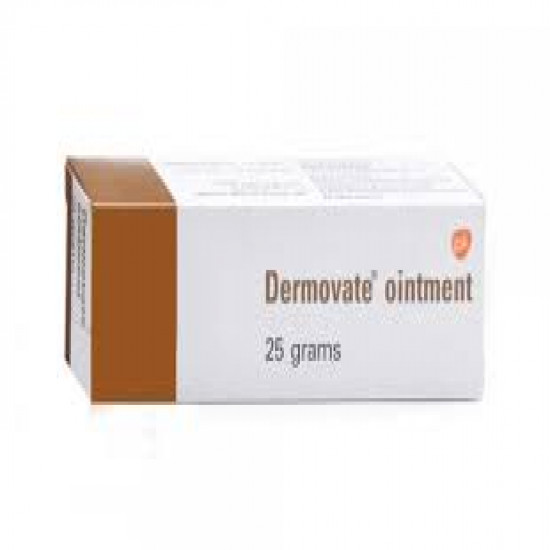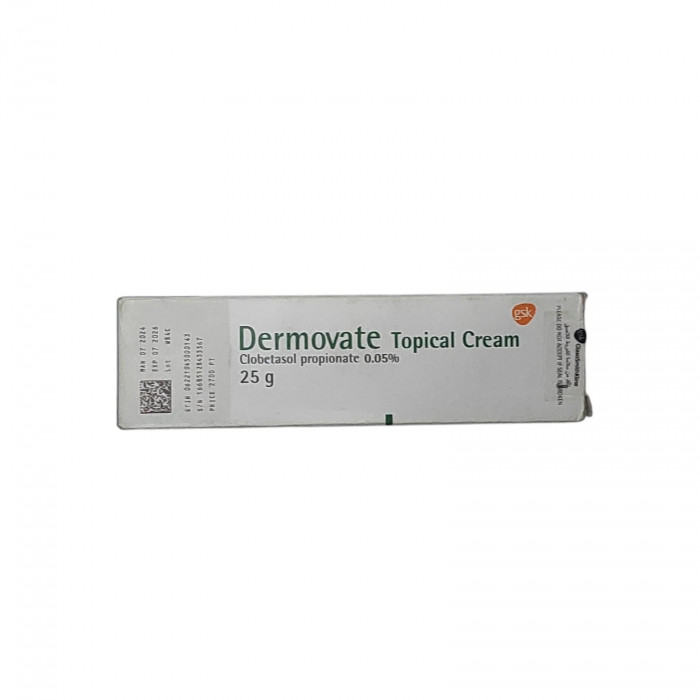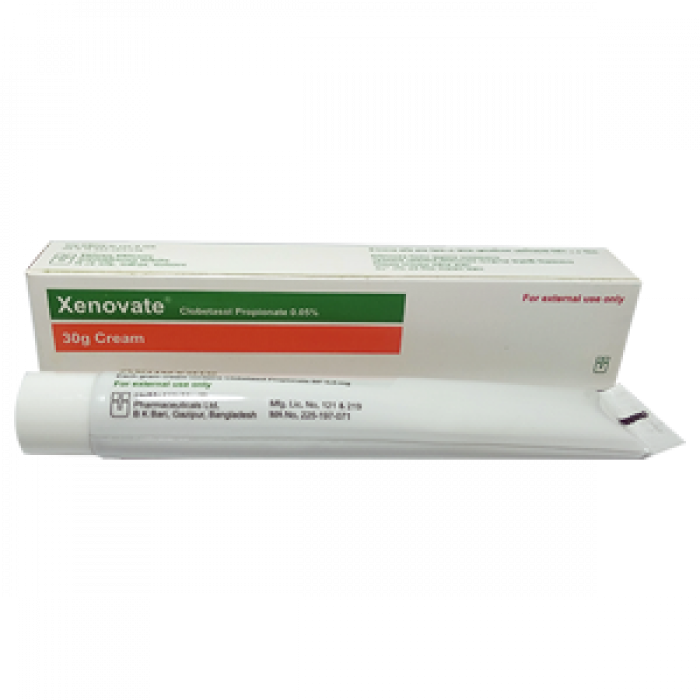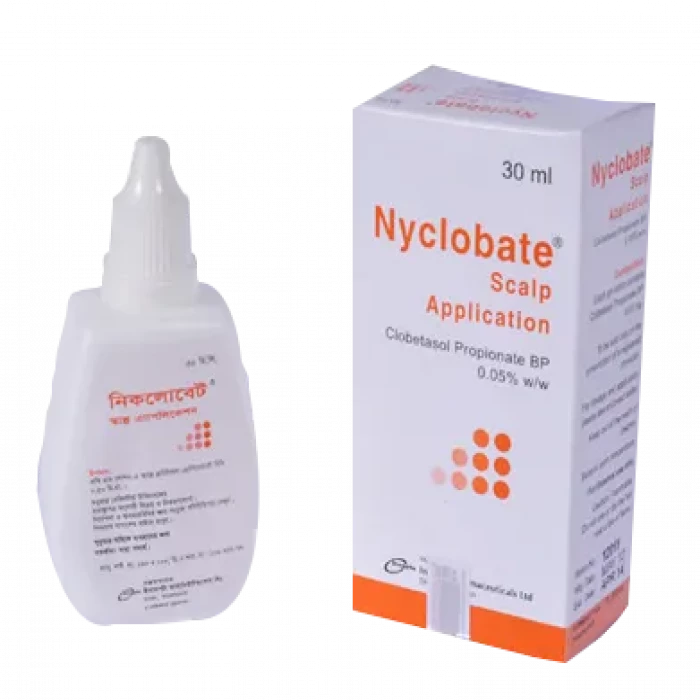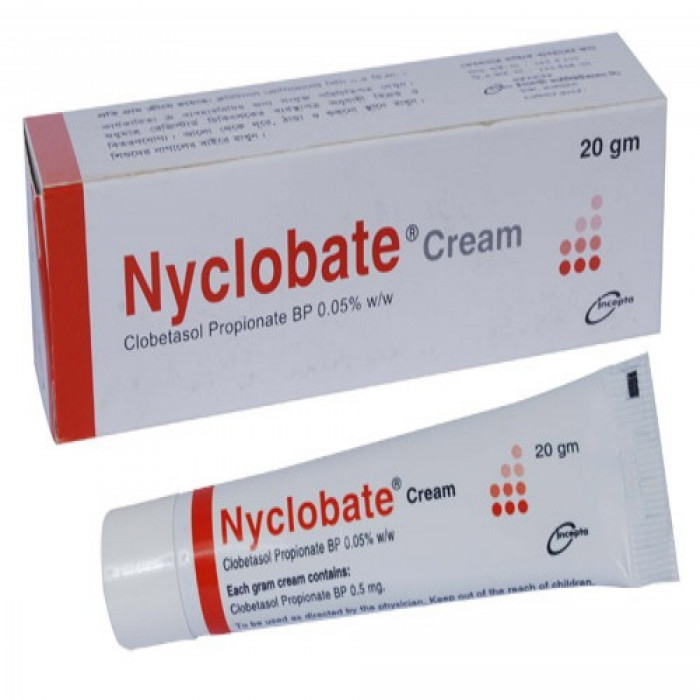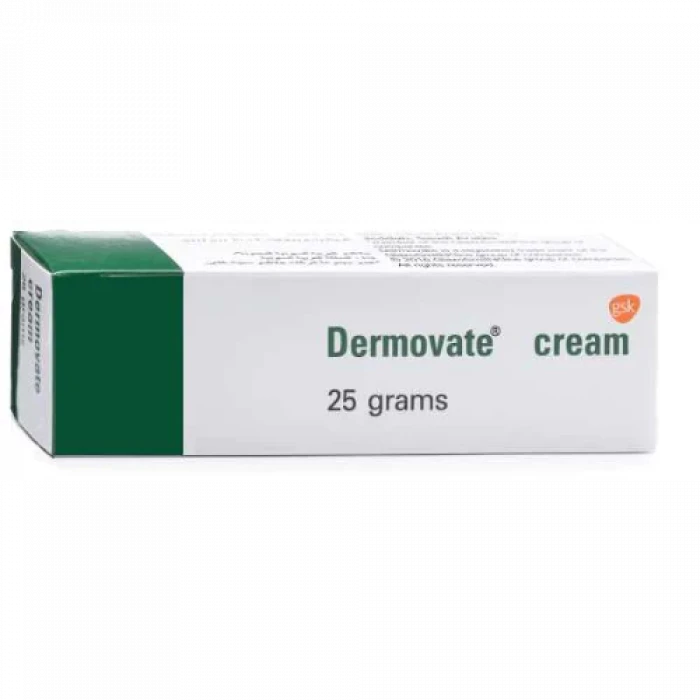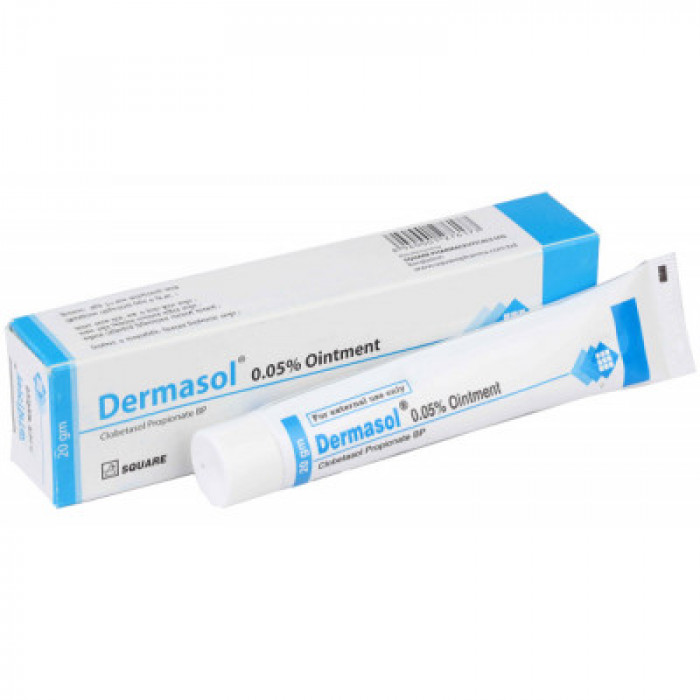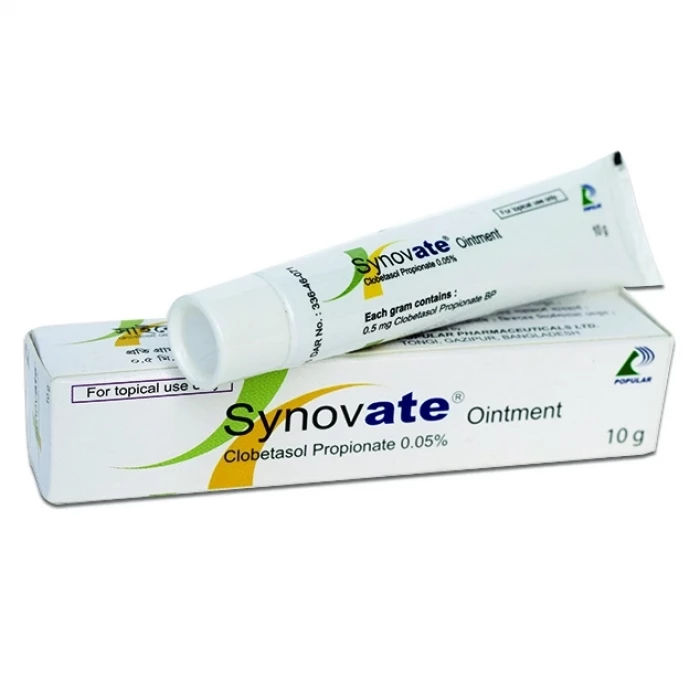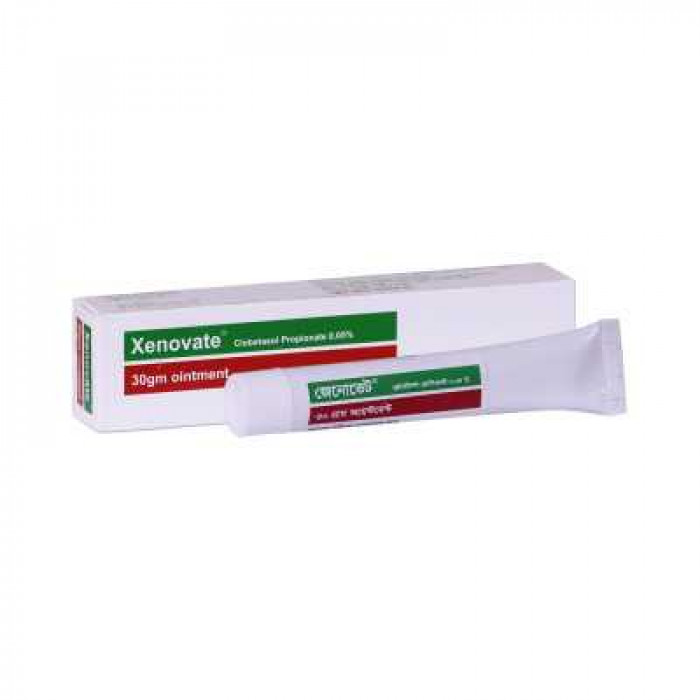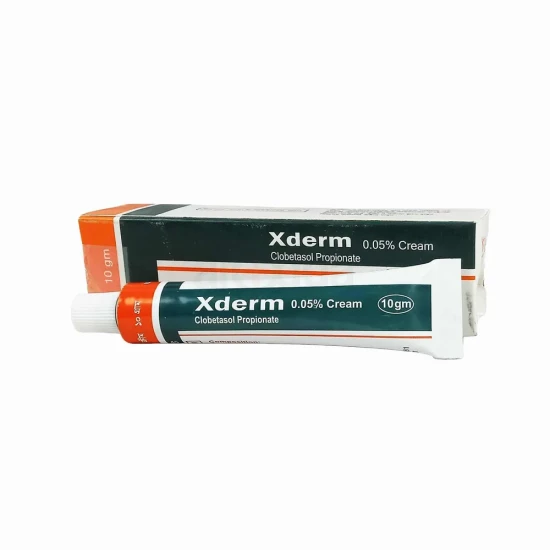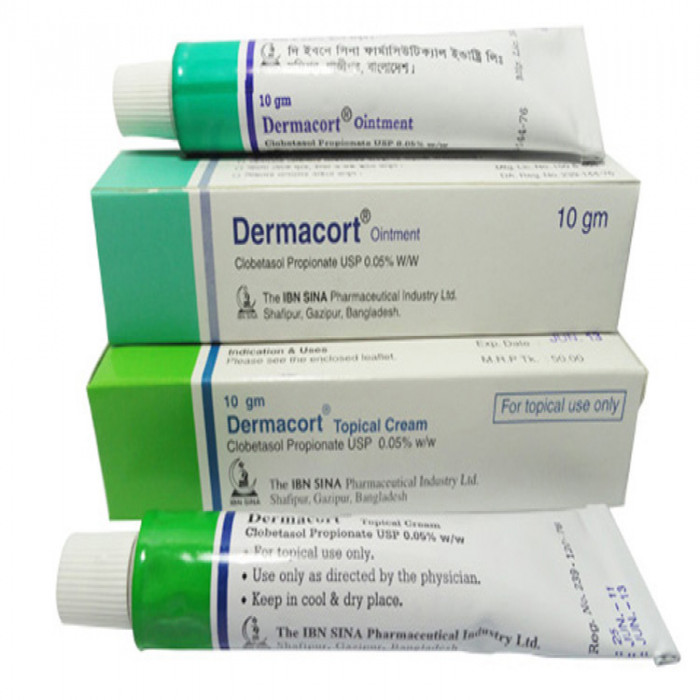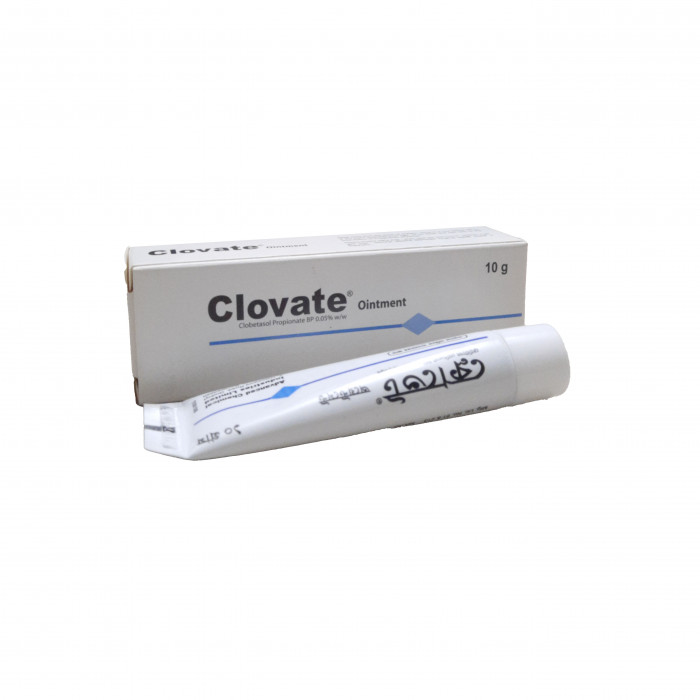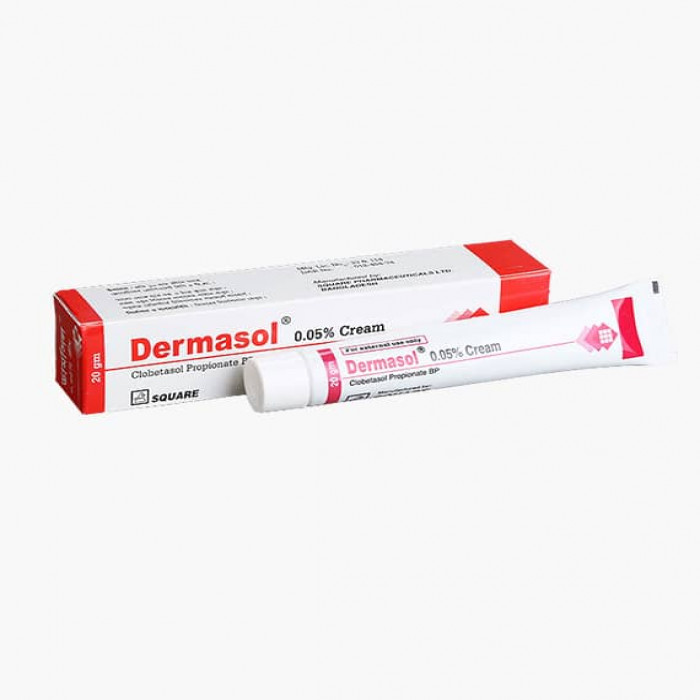
✔ 100% Authentic Product
👁️ Currently Viewing 7039
Dermasol 0.05% Cream 20gm
Dermasol Cream (Clobetasol Propionate 0.05%)belongs to a group of medicines called steroids. It is used to treat various skin conditions such as dermatitis, eczema, and allergies.
Discount
Price: ৳ 67
MRP:
৳
70.48
5%
Off

100% Genuine Products, Guaranteed

Safe & Secure Payments, Always

Fast, Secure & Efficient Delivery

Proper Packaging
 Cash on Delivery - All over Bangladesh
Cash on Delivery - All over Bangladesh Regular Delivery - 12-24 Hours, Dhaka City* Charge Tk.39-59
Regular Delivery - 12-24 Hours, Dhaka City* Charge Tk.39-59 Regular Delivery - 24-48 Hours, Other Cities* Charge Tk.99-110
Regular Delivery - 24-48 Hours, Other Cities* Charge Tk.99-110
 ফ্রি ডেলিভারিঃ - ৯৯৯ টাকা+ অর্ডারে, ঢাকা
শহরে
ফ্রি ডেলিভারিঃ - ৯৯৯ টাকা+ অর্ডারে, ঢাকা
শহরে ফ্রি ডেলিভারিঃ - ২৯৯৯ টাকা+ অর্ডারে, ঢাকার
বাহিরে
ফ্রি ডেলিভারিঃ - ২৯৯৯ টাকা+ অর্ডারে, ঢাকার
বাহিরে
100% Genuine Products, Guaranteed
Safe & Secure Payments, Always
Fast, Secure & Efficient Delivery
Proper Packaging
 Cash on Delivery - All over Bangladesh
Cash on Delivery - All over Bangladesh Regular Delivery - 12-24 Hours, Dhaka City* Charge Tk.39-59
Regular Delivery - 12-24 Hours, Dhaka City* Charge Tk.39-59 Regular Delivery - 24-48 Hours, Other Cities* Charge Tk.99-110
Regular Delivery - 24-48 Hours, Other Cities* Charge Tk.99-110 ফ্রি ডেলিভারিঃ - ৯৯৯ টাকা+ অর্ডারে, ঢাকা
শহরে
ফ্রি ডেলিভারিঃ - ৯৯৯ টাকা+ অর্ডারে, ঢাকা
শহরে ফ্রি ডেলিভারিঃ - ২৯৯৯ টাকা+ অর্ডারে, ঢাকার
বাহিরে
ফ্রি ডেলিভারিঃ - ২৯৯৯ টাকা+ অর্ডারে, ঢাকার
বাহিরে
✅ Description:
- Dermasol 0.05% Cream is a topical medication used to treat skin conditions like eczema, dermatitis, and psoriasis. It works by reducing the production of certain chemicals in the body, which helps to alleviate redness and swelling of the skin.
- When using Dermasol 0.05% Cream, you may experience side effects such as a burning sensation, itching, and redness at the application site. These side effects are usually temporary and tend to resolve as your body adjusts to the medication. If these side effects persist or worsen, it is important to inform your doctor. Dermasol 0.05% Cream is intended for external use only. Before applying the gel, clean the affected area and gently pat it dry. Apply a thin layer of the gel to the affected area and spread it evenly. Take care to avoid direct contact with your eyes and mouth. If accidental contact occurs, promptly wash your eyes and mouth. It is important not to use this medication for longer than the recommended duration.
- If you are allergic to Dermasol 0.05% Cream, it should be avoided. Inform your doctor about any other skin conditions you may have or if you are using other topical medications. It is also advisable to consult your doctor if you are pregnant or breastfeeding before using this medication.
Safety Advices

Alcohol
CAUTION
Interaction with alcohol is unknown. It is advisable to consult your doctor before consumption.

Pregnancy
CONSULT YOUR DOCTOR
Due to a lack of sufficient safety data, Dermasol 0.05% Cream is not recommended for use during pregnancy. Hence, consult your doctor if you are pregnant.

Breastfeeding
CONSULT YOUR DOCTOR
It is not known if Dermasol 0.05% Cream passes into breastmilk. Hence, if you are breastfeeding, consult your doctor to understand the potential risks and benefits before using this medicine. If your doctor has recommended this medicine, avoid applying it to the breast area to prevent accidental ingestion by your baby.

Driving
No interaction found/established

Kidney
No interaction found/established

Liver
No interaction found/established
✔️ Uses of Dermasol 0.05% Cream
- Dermatitis
- Eczema
- Allergic skin conditions
✔️ How does Dermasol 0.05% Cream work?
Dermasol 0.05% Cream works with the help of corticosteroids to calm down irritated skin. These corticosteroids help reduce inflammation, redness, and itching of the skin. When you apply clobetasol propionate cream on your skin, it shrinks the blood vessels. This in turn stops the release of irritating substances and decreases the production of certain cells that cause inflammation. This helps to soothe the skin and promotes skin healing.
✔️ Side Effects of Dermasol 0.05% Cream
Clobetasol propionate cream may cause the following side effects:
Common side effects:
- Burning, itching, irritation, redness, or dryness of the skin.
- Acne.
- Tiny red bumps or rash around the mouth.
- Small white or red bumps on the skin.
- Bruising or shiny skin.
- Red or purple blotches or lines under the skin.
- Thin, fragile, or dry skin.
- Changes in skin color.
Serious side effects:
- Redness, swelling, oozing pus, or other signs of skin infection in the area where you applied the cream.
- Severe rash or skin sores.
- Changes in the way fat is distributed in the body.
- Sudden weight gain.
- Unusual tiredness.
- Muscle weakness.
- Depression or irritability.
It is important to seek immediate medical attention if you experience any of the serious side effects mentioned above.
In children, the use of clobetasol propionate cream may potentially lead to reduced growth and delayed weight gain. It is recommended to consult your child's doctor before applying the medication to your child's skin to discuss the potential risks and benefits.
If you have any concerns or notice any unusual symptoms while using clobetasol propionate cream, it is advisable to contact your doctor for further evaluation and guidance.
✔️ Quick Suggestions:
- Dermasol Cream is used to treat redness, swelling, itching, and discomfort of various skin conditions.
- It should be applied to the affected areas as a thin film two or three times daily, or as advised by your doctor.
- Don't use it more often or for longer than advised by your doctor.
- Don't cover the area being treated with airtight dressings such as bandages unless directed by a doctor, as this may increase the risk of side effects.
- If you think the area of skin you are treating has become infected you should stop using Dermasol Cream and consult your doctor.
- Consult your doctor if your skin condition has not improved after four weeks of treatment. Do not use it for more than 4 consecutive weeks at a time.
✔️ Indication
Clobetasol propionate is prescribed to treat the following dermatoses in adults, the elderly, and children over the age of one year:
- Recalcitrant dermatoses: This term refers to skin conditions that do not respond well to other, less potent steroids or treatments.
- Lichen planus: It is an inflammatory skin condition characterized by itchy, flat-topped bumps that can appear on the skin, mucous membranes, or nails.
- Discoid lupus erythematosus: It is a chronic autoimmune disease that primarily affects the skin, causing coin-shaped patches of red, scaly skin.
- Other skin disorders that do not respond well to milder steroids: Clobetasol propionate may be used in cases where other topical corticosteroids have been ineffective in treating certain skin disorders.
- Psoriasis (excluding broad plaque psoriasis): Psoriasis is a chronic skin condition characterized by thickened, red, and scaly patches of skin. Clobetasol propionate may be prescribed for psoriasis cases that are not classified as broad plaque psoriasis.
✔️ Pharmacology
Clobetasol is a very potent corticosteroid that is used for short-term treatment of various inflammatory skin conditions. Corticosteroids like clobetasol work by reducing inflammation through multiple mechanisms. Here are some of the ways in which corticosteroids exert their anti-inflammatory effects:
Stabilizing leukocyte lysosomal membranes: Corticosteroids stabilize the membranes of certain immune cells called leukocytes, preventing the release of destructive acid hydrolases from these cells.
Inhibiting macrophage accumulation: Corticosteroids reduce the accumulation of macrophages, a type of immune cell, in inflamed areas of the skin.
Reducing leukocyte adhesion: Corticosteroids decrease the adhesion of leukocytes to the endothelium (the inner lining of blood vessels), thereby reducing their migration to inflamed areas.
Decreasing capillary wall permeability and edema formation: Corticosteroids help to reduce the permeability of capillary walls, which helps in reducing the leakage of fluid into tissues and the formation of edema (swelling).
Decreasing complement components: A complement is a group of proteins involved in immune responses. Corticosteroids can reduce the levels and activity of complement components, which contribute to inflammation.
Antagonizing histamine activity and release of kinin: Corticosteroids counteract the activity of histamine, a chemical involved in allergic reactions and inflammation. They also reduce the release of kinin, another group of chemicals that promote inflammation.
Reducing fibroblast proliferation and collagen deposition: Corticosteroids inhibit the proliferation of fibroblasts, and cells involved in tissue repair, and reduce the deposition of collagen, which helps in preventing excessive scar tissue formation.
✔️ Dosage & Administration of Dermasol 0.05% Cream
The adult dose recommendations for clobetasol in various dermatoses are as follows:
- Corticosteroid-responsive Dermatoses Cream: Apply a thin layer to the affected areas every 12 hours and gently rub it in until completely absorbed. The total weekly application should not exceed 50 grams.
- Scalp Psoriasis Shampoo: Apply a thin film of the shampoo to the dry scalp once a day. Leave it in place for 15 minutes, then add water, lather, and rinse thoroughly.
- Moderate to Severe Plaque-type Psoriasis Cream/Lotion: Apply to the affected area on the scalp every 12 hours for up to 2 weeks if the area is less than 10% of the body surface area. The total weekly application should not exceed 50 grams.
For children under 12 years of age, the safety and efficacy of clobetasol have not been established. Therefore, it is not recommended for use in this age group.
For children 12 years and older, the dosing recommendations are the same as for adults, following the guidelines mentioned above for corticosteroid-responsive dermatoses, scalp psoriasis shampoo, and moderate to severe plaque-type psoriasis cream/lotion.
It is important to follow the instructions provided by your healthcare provider and not exceed the recommended dosage. If you have any questions or concerns about the appropriate dosage for your specific condition, consult with your healthcare professional.
✔️ Preparation:
- Wash your hands thoroughly before and after using the cream.
- Do not wash your hands if you are applying the cream to your hands.
- Ensure that the affected area is clean and dry before applying the cream.
✔️ Application:
- Spread a thin layer of the cream or ointment over the affected area of the skin.
- Apply the product to your skin with gentle smoothing motions, following the direction of hair growth.
- Avoid applying the cream or ointment on broken skin or cuts.
- Apply the cream or ointment to all areas of irritated skin.
- If you are directed to use the cream twice a day, try to space out applications by 8 to 12 hours.
- Do not use clobetasol propionate cream simultaneously with other creams or moisturizers. Allow at least 30 minutes between applications of the cream and other products.
- If you are told to apply a dressing like a bandage or plaster, wait at least 10 minutes after applying the cream.
- Do not use clobetasol propionate cream past its expiry date.
✔️ Interaction
Co-administration of medications that inhibit the enzyme CYP3A4, such as ritonavir and itraconazole, can inhibit the metabolism of corticosteroids. This inhibition can lead to increased systemic exposure to corticosteroids, potentially resulting in an increased risk of systemic side effects. It is important to be cautious when using corticosteroids in combination with such medications, and close monitoring by a healthcare professional is recommended to ensure the appropriate and safe use of these medications together. If you are taking any medications that inhibit CYP3A4, it is important to inform your healthcare provider before using corticosteroids. They can provide guidance on the potential interactions and adjust the dosages if necessary.
✔️ Contraindications
Dermasol 0.05% Cream is not recommended for use in children under 12 years of age. It is primarily used for long-term treatment of ulcerative conditions, rosacea, and pruritus. However, it is contraindicated in certain cases, including:
- Rosacea: Dermasol 0.05% Cream should not be used in individuals with rosacea.
- Acne vulgaris: It is contraindicated in individuals with acne vulgaris.
- Perioral dermatitis: Dermasol 0.05% Cream should not be used in individuals with perioral dermatitis.
- Primary cutaneous viral infections: It is contraindicated in cases of primary cutaneous viral infections, such as herpes simplex and chickenpox.
- Otitis externa with a perforated eardrum: The use of Dermasol 0.05% Cream is contraindicated in individuals with otitis externa (outer ear canal infection) when there is a perforated eardrum.
- Hypersensitivity: If you have a known hypersensitivity or allergy to the preparations containing Dermasol 0.05% Cream, it should be avoided.
- Scalp infection: The scalp application of Dermasol 0.05% Cream should not be used in cases of scalp infection.
✔️ Pregnancy & Lactation
Safety data on the use of clobetasol in pregnant women is not available. However, published data suggest a significantly increased risk of low birth weight when using potent or very potent topical corticosteroids exceeding 300 grams during pregnancy. Pregnant women should be informed about the potential risk to the fetus, and clobetasol should be used on the smallest area of skin and for the shortest duration possible.
Animal reproduction studies have shown increased malformations, such as cleft palate and skeletal abnormalities when clobetasol was administered subcutaneously to pregnant mice and rabbits.
Regarding lactation, there is no information available on the presence of clobetasol in breast milk or its effects on the breastfed infant or milk production. Systemically administered corticosteroids can appear in human milk and may have adverse effects on the breastfed infant, such as growth suppression and interference with endogenous corticosteroid production. It is unknown whether topical administration of clobetasol can result in sufficient systemic absorption to detectable quantities in human milk.
To minimize potential exposure to the breastfed infant, clobetasol should be used on the smallest area of skin and for the shortest duration possible while breastfeeding. Breastfeeding women should be advised to avoid applying clobetasol directly to the nipple and areola to prevent direct exposure to the infant. It is recommended to consult with a healthcare professional for individualized guidance on the use of clobetasol during pregnancy and lactation.
✔️ Precautions & Warnings
- Long-term continuous use of clobetasol or any potent corticosteroid should be avoided whenever possible, especially in infants and children, as it can lead to adrenal suppression even without occlusion (covering the treated area). In children, or when applied on the face, treatment courses should be limited to 5 days and occlusion should not be used. Care should be taken to ensure that the medication does not enter the eyes when applied to the eyelids.
- When using clobetasol for psoriasis, close supervision by a healthcare professional is important to ensure the appropriate and safe use of the medication.
- For scalp application of clobetasol, it is important to keep the product away from the eyes. It is also important to note that the scalp application is flammable, so it should not be used or applied near open flames or sources of ignition.
- When using clobetasol scalp shampoo, it should only be used on the scalp and not on other areas of the body. Care should also be taken to avoid contact with the eyes.
- Regarding lactation, the excretion of clobetasol in breast milk is unknown. Therefore, caution should be exercised when using this medication during breastfeeding.
- It is important to carefully follow the instructions provided by your healthcare professional and the product labeling to ensure the safe and effective use of clobetasol.
✔️ Storage Conditions
Keep the temperature below 30°C and away from light and moisture. Do not allow yourself to become frozen. Keep out of children's reach.
⚠️Disclaimer:
At ePharma, we’re committed to providing accurate and accessible health information. However, all content is intended for informational purposes only and should not replace medical advice from a qualified physician. Please consult your healthcare provider for personalized guidance. We aim to support, not substitute, the doctor-patient relationship.





